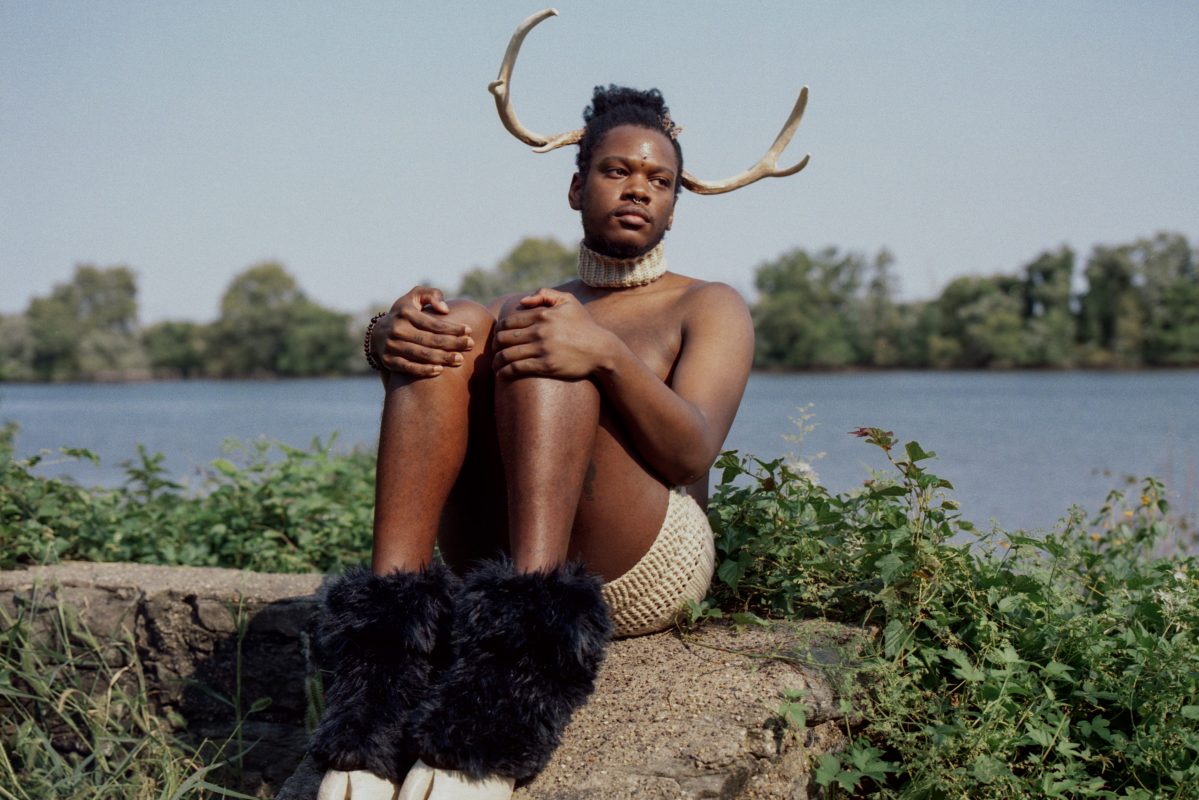The first things you’ll notice if you pick up a copy of Heterosexuality, the eighth album by Shamir Bailey — who performs as the mononymous Shamir — are the horns and the hooves. He sports them and sits defiantly on its cover, dressed as a Baphomet, the mythical goat-like creature meant to symbolize “the equilibrium of opposites”: human and animal, man and woman, good and evil.
It’s a fitting image, of course. Since he first burst onto the scene with his acclaimed 2015 debut Ratchet, Bailey has refused to be confined by outdated black-and-white thinking. He came out as non-binary in 2014 (though he still uses he/him pronouns). But even outside of his gender identity, he defies categorization. After Ratchet, he was dropped by his label XL Recordings for refusing to compromise on his artistic vision; they wanted another album full of dance-pop bangers like his first one, but he preferred to explore other genres like folk, lo-fi, indie rock, country and even grunge. For years now, narrow-minded people have had no idea what to make of him. The Baphomet imagery is meant to be commentary on how they see — or rather, gawk at — him. (“I just knew that I wanted to do this kind of subhuman thing, because it’s also kind of a metaphor for how I kind of felt like an animal in the zoo sometimes because of my explicit queerness,” he recently explained to Stereogum.)
Heterosexuality (out Friday via AntiFragile Music) is the first time that the 26-year-old artist has tackled issues like gender, sexuality and that self-described “explicit queerness” head-on in an album. On the excellent “Gay Agenda,” he sings, “You’re just stuck in the box that was made for me/And you’re mad I got out and I’m living free,” and on “Cisgender,” he soars to the top of his register as he lays it all out for those who can’t wrap their minds around his gender identity: “I’m not cisgender/I’m not binary trans/I don’t wanna be a girl, I don’t wanna be a man/I’m just existing on this god forsaken land/And you can take it or leave it or you can just stay back.” Of course, Bailey tells InsideHook, these themes have always been present in his work.
“I think I’ve always addressed my queerness in my music,” he says. “It’s never been something that I shied away from. I think the only difference about this is that it’s the first time that it’s been consolidated into the whole album and tied into the aesthetic in a lot of ways and everything. And honestly, I think I’ve held off or brought it in this very explicit manner because there’s a lot of trauma around me being, I guess even more explicit than I already am about my queerness in my music. Because I feel like, especially in the beginning of my career, a lot of my queerness was very much exploited, and there would be times where I felt like it would overshadow my actual work, even when certain work that was being talked about was not about my queerness at all.”
“I think now, on my [new] album, I’m more mature and also know how to approach it in a way where I’m not just talking about it being a quote unquote queer album,” he continues. “And that’s what’s been really great about all the interviews [I’ve done] so far is that first of all, we’re past it. Obviously, when I first came out in 2014, the concept of a queer body like my own was way more foreign than it is now. So I think definitely the times play a part in that as well. I think it’s a combination of the times making it a little bit more easier for me to make an album like this and then also just the wisdom that I’ve accumulated over eight records.”
Of course, reducing Heterosexuality to a “queer album” overlooks the broader issues it confronts, like generational trauma (on the excellent “Reproductive”), the prison abolition movement, racism, gun control and wealth disparity. He delves into the latter on “Abomination,” a track he describes as “my only truly political song.” “Can’t trust the government to change shit,” he warns. “Unless it’s just for optics, say my life matter, but it’s just an option/Madam vice president a cop, don’t cop shit, being pushed to you as progress, for profit.”
“It’s so different from the rest of the album,” Bailey says. “When I first sent it to one of my best friends, he said, ‘no comment,’ and I was almost scared to put it on the record. Even though the song doesn’t even really talk about global warming or whatever, I guess just the feeling of activism and making something political overtook me while I was watching a Greta Thunberg documentary. That’s what inspired me. I was watching Greta Thunberg and I was like, ‘She’s amazing.’”
Whatever his inspiration may be, when it strikes, Bailey follows its lead. He’s constantly writing — as you might imagine, given the fact that he’s managed to put out eight full-length albums in the span of seven years. It’s not that he decided to churn out music at such an impressive clip, however; he simply has to, he insists.
“Music to me is my journal, I think,” he explains. “It’s how I scrapbook my life. So I don’t think of it as work or songs really. Songwriting for me and honestly just being creative in general, it’s gone past the point of passion and just a job or even something that I do at this point. I liken it to a bodily function. Everyone loves the cathartic feeling of peeing, but I don’t think anyone feels passionate about peeing. And that’s what songwriting — or just being creative in general — feels like to me at this point: just a bodily function that I have to do to survive. So that’s why I’m very prolific.”
Eventually, he combs through those musical scrapbook entries and finds common threads or a thesis he can build an album around. But while Heterosexuality is arguably his most personal record to date, he didn’t go into it with any particular agenda, preferring to tap into his thoughts and emotions as they came — a new process for him, one that freed him of expectations and puts the onus on the listener to take it all in and interpret however they see fit. Like the Baphomet, it can mean a lot of different things to different people.
“This might be the reason why this is my favorite record, because realistically there’s really no mission statement,” Bailey says. “It really isn’t. It’s really the first time where I just laid out what I was feeling in the moment. And that’s rare for me. Because usually I feel like all my other records definitely have some kind of mission statement. This one doesn’t. I think this is for people to take from it what they need.”
Heterosexuality will be released in stores and on streaming platforms February 11.
This article appeared in an InsideHook newsletter. Sign up for free to get more on travel, wellness, style, drinking, and culture.
























